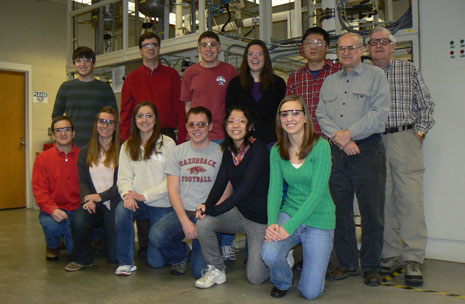
FAYETTEVILLE, Ark. – Chemical engineering students at the University of Arkansas are working on a project that will help clean up pollution and reduce our dependency on fossil fuels. Their research, which involves designing and building a device that can easily convert algae and other plant material into fuel, could be featured on national television if the team can get enough votes.
Planet Forward, a project of the Center for Innovative Media at George Washington University, features ideas about energy, climate and sustainability on its website and through television specials, which air on public television stations across the country. Planet Forward’s Earth Day special is scheduled for April 9, and will feature the winners of its online video contest. Currently, over 800 ideas have been submitted to the contest, and 17 entries have been nominated for online voting, including the submission from the University of Arkansas.
To see the contest nominees and vote, visit the Planet Forward website. Voting ends at midnight on Thursday, Feb. 17.
The University of Arkansas project focuses on using algae to produce biofuels such as butanol. Algae, which grow quickly in streams and ponds, can be used to remove pollutants such as nitrogen and phosphorus from the water and then be harvested to make clean-burning biofuel. In addition, the leftover plant material can be used as fertilizer.
Led by faculty adviser Jamie Hestekin, and co-advisers Bob Beitle and Roy Penney, the students are designing a biofuel miniprocessing unit, a machine that can turn algae and other biomass directly into fuel. Their device, which will be small enough to fit in the back of a pick-up truck and will produce a few milliliters of fuel-grade butanol at a time, could serve as a model for larger applications of this technology. For example, a larger machine based on this model could be used by farmers to turn plants directly into fuel for farm equipment.
“The projects that the students are working on could allow Arkansas to make a big impact in energy independence in this country,” said Hestekin.
Twelve students are taking part in this project, including undergraduates Elizabeth Bevan, Ethan Carter, Megan Huslig, Jill Ivey, Ali McAtee, Hiroko Nakao, Kylan Rakestraw, Lizbeth Rostro, Michelle Shepherd, and Jeremy Stout. Two doctoral students, Jianjun Du and Tom Potts, are also involved. Five of the undergraduate students will be incorporating the project into their honors theses, and Ali McAtee has received a grant from the Honors College to support her work with this project.
Topics
Contacts
Jaime Hestekin, assistant professor of chemical engineering
College of Engineering
479-575-3492,
Camilla Shumaker, director of science and research communications
University Relations
479-575-7422,